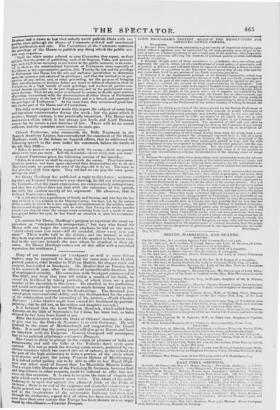Colonel Fortescue, who commands the Rifle Regiment in the Spanish
Auxiliary Legion, has contradicted the statement of Sir Henry Ifardinge, made in the debate on Spanish affairs, that he addressed the following speech to the men under his command, before the battle of the 4th May 1886-
" Rifles, to morrow we will be engaged with the enemy—show no quarter sliver every man you meet. Kill the wounded—skiver every man you meet.' Colonel Fortescue gives the following version of his speech-
" Ridee, to morrow we shall be engaged with the enemy. They have never_ shown us quarter, and have again expressed their determination not to do so.. They have made uo quarter the order of the day—let it be so. The same as they give thvy shall have again. They will find we can play the same game, and cquilty well."
Sir Hem y Hardinge has published a reply to this letter ; maintain- ing that, on Colonel Fortescue's own showing, he did not misrepresent the Colonel—that the exact expressions are comparatively unimportant, and that the Colonel does not deal with the substance of his speech, but with the shadow merely of his argument. He observes, that in Colonel Fortescue's letter,
"It is admitted that a gentleman of family and fortune, and who has the ho- nour to hold a commission in his Majesty's army, has been led, by the nature of the set vice in which he is now engaged, to recommend to the soldiers under his command to give no quarter, awl to state, that during the twelve months which have elapsed since the savage scene resulting from such a mode of war- fare pas,e41 belere his eyes, he has found no occasion to alter his recommen- datiou."
[It answers Sir Henry Hardinge's purpose to represent the exact ex- pressions as "comparatively unimportant ;" but they who heard Sir -Henry will not forget the reiterated emphasis he laid on the words "shiver every man you meet—kill Me wounded, shiver every man you meet." These words told in the debate • and the manner in which they were repeated proved the animus of the speaker to have been viru- lent in the extreme towards the men whom he attacked in their ab- sence. Sir Henry Hardinge comes out of this affair with a tarnished reputation for manliness.]


























 Previous page
Previous page